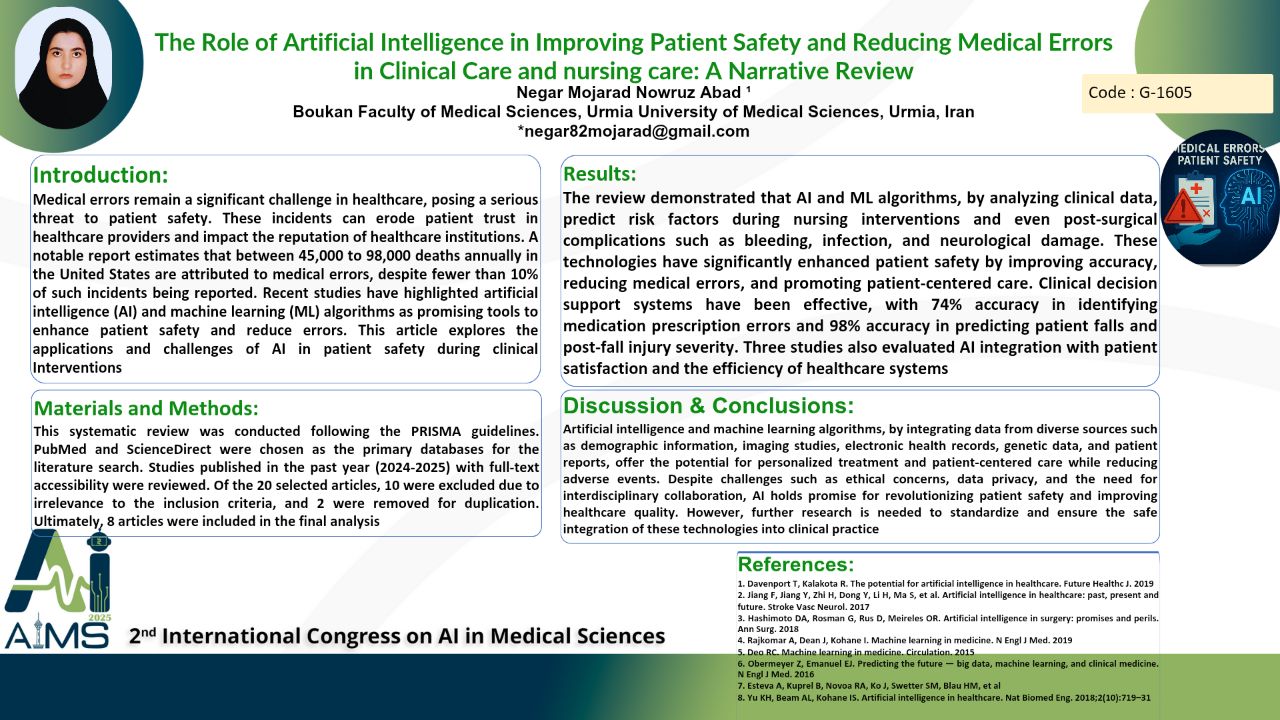The Role of Artificial Intelligence in Improving Patient Safety and Reducing Medical Errors in Clinical Care and nursing care: A Narrative Review
Code: G-1605
Authors: Negar Mojarad,Nowruz Abad * ℗
Schedule: Not Scheduled!
Tag: Clinical Decision Support System
Download: Download Poster
Abstract:
Abstract
Introduction: Medical errors remain a significant challenge in healthcare, posing a serious threat to patient safety. These incidents can erode patient trust in healthcare providers and impact the reputation of healthcare institutions. A notable report estimates that between 45,000 to 98,000 deaths annually in the United States are attributed to medical errors, despite fewer than 10% of such incidents being reported. Recent studies have highlighted artificial intelligence (AI) and machine learning (ML) algorithms as promising tools to enhance patient safety and reduce errors. This article explores the applications and challenges of AI in patient safety during clinical interventions. Methods: This systematic review was conducted following the PRISMA guidelines. PubMed and ScienceDirect were chosen as the primary databases for the literature search. Studies published in the past year (2024-2025) with full-text accessibility were reviewed. Of the 20 selected articles, 10 were excluded due to irrelevance to the inclusion criteria, and 2 were removed for duplication. Ultimately, 8 articles were included in the final analysis. Results: The review demonstrated that AI and ML algorithms, by analyzing clinical data, predict risk factors during nursing interventions and even post-surgical complications such as bleeding, infection, and neurological damage. These technologies have significantly enhanced patient safety by improving accuracy, reducing medical errors, and promoting patient-centered care. Clinical decision support systems have been effective, with 74% accuracy in identifying medication prescription errors and 98% accuracy in predicting patient falls and post-fall injury severity. Three studies also evaluated AI integration with patient satisfaction and the efficiency of healthcare systems. Conclusion: Artificial intelligence and machine learning algorithms, by integrating data from diverse sources such as demographic information, imaging studies, electronic health records, genetic data, and patient reports, offer the potential for personalized treatment and patient-centered care while reducing adverse events. Despite challenges such as ethical concerns, data privacy, and the need for interdisciplinary collaboration, AI holds promise for revolutionizing patient safety and improving healthcare quality. However, further research is needed to standardize and ensure the safe integration of these technologies into clinical practice.
Keywords
AI, Patient Safety, Medical Errors
